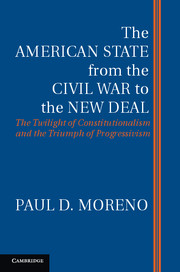 The American State from the Civil War to the New Deal
The American State from the Civil War to the New Deal Book contents
- Frontmatter
- Contents
- Abbreviations Used in the Footnotes
- Acknowledgments
- Introduction
- Part I The Old Regime
- Part II Early Progressivism
- 4 The New Jurisprudence
- 5 The Due Process Dialectic
- 6 Toward a Federal Police Power
- 7 Rooseveltian Progressivism
- 8 The Lochner Incident
- 9 Court and Constitution in Crisis
- 10 Taft and the Republican Crackup
- Part III Late Progressivism
- Part IV The New Deal
- Appendix A
- Appendix B
- Primary Sources
- Index
- References
4 - The New Jurisprudence
Published online by Cambridge University Press: 05 May 2013
- Frontmatter
- Contents
- Abbreviations Used in the Footnotes
- Acknowledgments
- Introduction
- Part I The Old Regime
- Part II Early Progressivism
- 4 The New Jurisprudence
- 5 The Due Process Dialectic
- 6 Toward a Federal Police Power
- 7 Rooseveltian Progressivism
- 8 The Lochner Incident
- 9 Court and Constitution in Crisis
- 10 Taft and the Republican Crackup
- Part III Late Progressivism
- Part IV The New Deal
- Appendix A
- Appendix B
- Primary Sources
- Index
- References
Summary
HISTORISM AND HISTORICISM
The orthodox constitutional system weathered the crisis of the 1890s, but that crisis also led many political actors and thinkers to novel approaches to deal with the problems of the new urban-industrial civilization. Scholars have collected these ideas and policies under the “progressive” heading. While difficult to define, progressivism shared a belief that the old constitutional system was inadequate, and that a significant empowerment of government (at whatever level) was needed. It shared the organic, evolutionary, and historicist features of post–Enlightenment, Romantic Western thought.
Significant critiques of orthodox constitutionalism predated the progressive era. Antebellum writers questioned the adequacy of the Lockean basis of constitutional mechanisms such as checks and balances. Sidney George Fisher, like many European observers, believed that the Civil War had proved the inadequacy of the Constitution, for the first time arguing that such features as the separation of powers had failed. Many schools of thought that twentieth-century progressive and liberal historians have characterized as “conservative” represented repudiations of the natural rights liberalism of the founding. The fact that these intellectual innovators usually defended the Gilded Age social and economic order has obscured their departure from its constitutional foundations. For example, many-nineteenth century historicists regarded the Constitution (and law in general) as the result of a people’s gradual adaptation to new economic and social circumstances. Historicists, sharing the larger Romantic reaction to the excesses of the French Revolution, preferred to emphasize continuity in American constitutional development, stressing the traditional “rights of Englishmen” rather than the American Revolution’s appeal to abstract, universal natural rights. Woodrow Wilson, for example, admired Walter Bagehot and the English historical approach to constitutional development – what Bagehot called “the living constitution.”
- Type
- Chapter
- Information
- The American State from the Civil War to the New DealThe Twilight of Constitutionalism and the Triumph of Progressivism, pp. 49 - 58Publisher: Cambridge University PressPrint publication year: 2013


